

New Insights on Gut Permeability and Depression. Scientists identified two bacteria from gut microbiota linked to mental health. Depression Starts In Your Gut. Defeat Depression Archives.
Essential science: Link between gut microbes and despair. The new study adds to a developing body of evidence which shows how bacteria influence host biology.
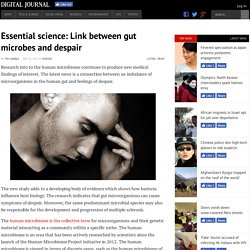
The research indicates that gut microorganisms can cause symptoms of despair. Moreover, the same predominant microbial species may also be responsible for the development and progression of multiple sclerosis. The human microbiome is the collective term for microorganisms and their genetic material interacting as a community within a specific niche. The human microbiome is an area that has been actively researched by scientists since the launch of the Human Microbiome Project initiative in 2012. The human microbiome is viewed in terms of discrete areas, such as the human microbiome of the skin.
The crystal structure of adenylosuccinate lyase (ASL) from Thermatoga maritima. UCLA-DOE Institute for Genomics and Proteomics via Microbe Wiki Part of the research involved seeing how antibiotics affect mouse models of the disease. Robyn Beck, AFP/File. Why Do I Feel So Blue Leaky Gut.
This is a post from the Gut Critters blog that ended November 8, 2016. Ray Medina gave permission for his material to be copied as long as it was attributed to him and not used for commercial purposes. – kiraonysko
The gut-brain axis - microbiome and depression — The American Microbiome Institute. Today I will be discussing a review from a little more than a year ago that discusses research that links the microbiome with stress, anxiety, and depression.
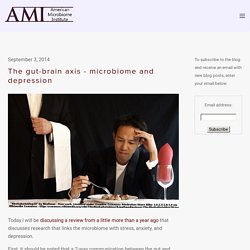
First, it should be noted that a 2-way communication between the gut and brain has already been established. The review goes on to mention studies in mice where not only are germ free mice associated with higher stress responses, but stress and anxiety early in life are associated with long-term changes in the microbiome. There was efficacy in reducing stress by treating stressed mice with probiotics.
Other studies however have shown germ-free mice to have reduced stress when compared to their counterparts. Depression - Series of Articles and Resources from a Functional Medicine Perspective. Is Depression a Disease—or a Symptom of Inflammation? The Gut Microbiome, Anxiety and Depression: 6 Steps to Take. Evolutionary Psychiatry: Depression and a Leaky Gut. First off, please go by and read That Paleo Guy's account of being in the middle of the latest Christchurch earthquake.
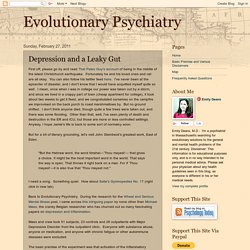
Fortunately he and his loved ones and cat are all okay. You can also follow his twitter feed here. I've never been at the epicenter of disaster, and I don't know that I would have acquitted myself quite so well. I mean, once when I was in college our power was taken out by a storm, and since we lived in a crappy part of town (cheap apartment for college), it took about two weeks to get it fixed, and we congratulated ourselves on the campfire we improvised on the back porch to roast marshmallows by. But no ground shifted. But for a bit of literary grounding, let's visit John Steinbeck's greatest work, East of Eden. "But the Hebrew word, the word timshel—‘Thou mayest’— that gives a choice.
I need a song. Back to Evolutionary Psychiatry. Maes and crew took 51 subjects, 23 controls and 28 outpatients with Major Depressive Disorder from the outpatient clinic. Diet, Depression, and the Microbiome. The Gut-Brain Axis: The Missing Link in Depression. Human Microbiota and Depression. Gut bacteria help regulate serotonin levels — The American Microbiome Institute. The researchers first discovered that germ-free mice produced substantially less serotonin than normal mice in their colons, but not in the small intestines, suggesting the importance of the colon microbiome in serotonin production.
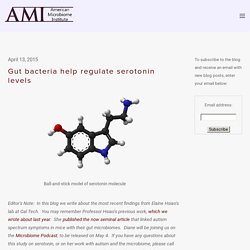
The scientists then investigated the levels of each enzyme responsible for serotonin production and pinpointed one called TPH1 that was produced at much lower levels in the germ free mice colons. When the germ-free mice were given TPH1 their serotonin levels returned to normal, and when regular mice were given antibiotics their serotonin levels dropped. Serotonin Availability Altered By Gut Microbiota Recognition Receptor. TLR2, a critical detector of the microbiota found in the intestine, regulates serotonin levels, scientists at the University of Exeter Medical School and University of Zaragoza in Spain have found.
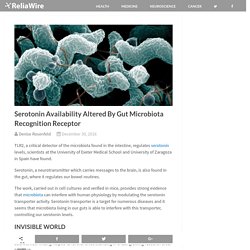
Serotonin, a neurotransmitter which carries messages to the brain, is also found in the gut, where it regulates our bowel routines. The work, carried out in cell cultures and verified in mice, provides strong evidence that microbiota can interfere with human physiology by modulating the serotonin transporter activity. Serotonin transporter is a target for numerous diseases and it seems that microbiota living in our guts is able to interfere with this transporter, controlling our serotonin levels. Invisible World Dr Eva Latorre, a postdoctoral researcher at the University of Exeter Medical School, said the new finding helped to further understanding in a fast-growing research area. Exploring the Relationship Between the Gut Microbiome and Depression.
Evolutionary Psychiatry: That Tapeworm Ate Your Depression. I'm a little embarrassed that Mark Sisson got to this one before I did.
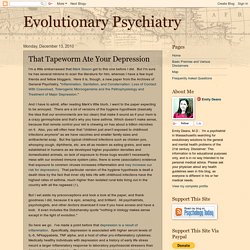
But I'm sure he has several minions to scan the literature for him, whereas I have a few loyal friends and fellow bloggers. Here it is, though, a new paper from the Archives of General Psychiatry, "Inflammation, Sanitation, and Consternation: Loss of Contact With Coevolved, Tolerogenic Microoganisms and the Pathophysiology and Treatment of Major Depression. " And I have to admit, after reading Mark's little blurb, I went to the paper expecting to be annoyed. There are a lot of versions of the hygiene hypothesis (basically the idea that our environments are too clean) that make it sound as if your mom is a crazy germophobe and that's why you have asthma.
Which doesn't make sense, because that remote control your kid is chewing on has about a billion microbes on it. But I set aside my preconceptions and took a look at the paper, and thank goodness I did, because it is epic, amazing, and brilliant. So here we go.